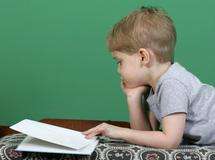New piece in reading ability 'jigsaw'

(PhysOrg.com) -- A gene thought to be associated with dyslexia is also connected with reading ability in the general population, according to Oxford University research.
The study funded by the Wellcome Trust and published today in the American Journal of Psychiatry suggests that a common variant of the gene, carried by more than one in seven people, is associated with poor reading ability.
Dyslexia is a learning difficulty which affects the development of literacy and language related skills, such as reading and spelling, but does not affect overall IQ. It is believed that as many as one in ten people are affected by dyslexia to some degree.
Previous research has identified at least six candidate genes that appear to affect susceptibility to developing dyslexia. However, scientists have often failed to replicate these findings, suggesting that their role in causing dyslexia is debatable.
The most promising of the candidates is the gene KIAA0319, which lies on chromosome 6. Researchers at the Wellcome Trust Centre of Human Genetics, University of Oxford, have previously identified a haplotype – a particular DNA sequence which spans part of this gene – associated with dyslexia in both a large samples of UK families and a samples of twins in the US. This association was also identified independently by researchers at Cardiff University.
Now the researchers have looked at the association between this particular haplotype, which is carried by 15% of the population, and general reading ability. They worked with a group of over 6,000 seven to nine year old children from Children of the 90s, also know as the Avon Longitudinal Study of Parents and Children (ALSPAC), an ongoing research project based at the University of Bristol.
‘On average, people carrying this common genetic variant tended to perform poorly on tests of reading ability,’ says Dr Silvia Paracchini of the Wellcome Trust Centre for Human Genetics and lead author of the study. ‘However, it's important to note that this is only true for reading ability and not for IQ, so it doesn't appear to be connected to cognitive impairment.’
‘This is clearly only part of the jigsaw puzzle that explains why some people have poorer reading ability than others or develop dyslexia,’ she adds. ‘There are likely to be many other contributing factors, but our research provides some valuable clues. We need to carry out studies into the exact role that this gene plays in brain development and how this affects people's reading ability.’
Provided by Oxford University





















